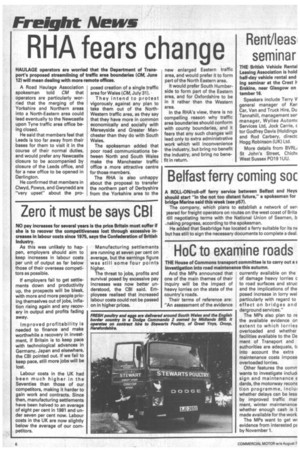Zero it must be says CBI
Page 6

If you've noticed an error in this article please click here to report it so we can fix it.
NO pay increases for several years is the price Britain must suffer if she is to recover the competitiveness lost through excessive increases in labour costs since 1975, says the Confederation of British Industry.
As this was unlikely to happen, employers should aim to keep increases in labour costs per unit of output as far below those of their overseas competitors as possible.
If employers fail to get settlements down and productivity up, the prospects will be bleak, with more and more people pricing themselves out of jobs, inflation rising again and any recovery in output and profits fading away.
Improved profitability is needed to finance and make worthwhile a recovery in investment, if Britain is to keep pace with technological advances in Germany, Japan and elsewhere, the CBI pointed out. If we fail to keep pace, still more jobs will be lost.
Labour costs in the UK had been much higher in the Seventies than those of our competitors, making it harder to gain work and contracts. Since then, manufacturing settlements have been halved to an average of eight per cent in 1981 and under seven per cent now. Labour costs in the UK are now slightly below the average of our cornpetito rs. Manufacturing settlements are running at seven per cent on average, but the earnings figure was still some four points higher.
The threat to jobs, profits and survival posed by excessive pay increases was now better understood, the CBI said. Employees realised that increased labour costs could not be passed on in higher prices.






















































